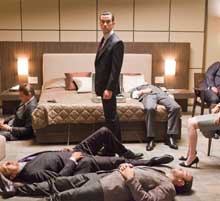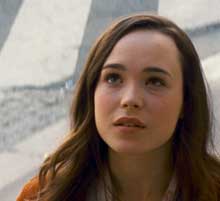Inception plays as if Christopher Nolan was in a pub one night and an angry drunk shouted “Oi! Nolan! Think you’re clever with your intertwining narratives and chronological playfulness? I bet you can’t juggle five different threads at once though, spacially, temporally and in a coherent and entertaining fashion!”, and Nolan went off and did it, just to prove a point. He succeeds, but at the expense of characterisation and a sense of any meaning or purpose.
 That isn’t to say that Inception isn’t marvellous; in fact it’s a masterpiece both technically and structurally. Trying to keep up is like trying to watch several different films at the same time while your brain is chewing a massive toffee, but if you can keep up then it’s an intellectually rewarding experience.
That isn’t to say that Inception isn’t marvellous; in fact it’s a masterpiece both technically and structurally. Trying to keep up is like trying to watch several different films at the same time while your brain is chewing a massive toffee, but if you can keep up then it’s an intellectually rewarding experience.
From a technical perspective, it’s stunning. Some have complained that the dreamscapes aren’t actually all that dream-like but I’m happy sitting in Nolan’s mind, all neat, straight lines, precision explosions and literal metaphors rather that than some godawful Christopher Columbus-style world of smeared, bright colours and Hollywood surrealism and My First Freudian Analogies. Ever listen to somebody else tell you about their dreams? It’s fucking boring, most of the time. I want to dream like Nolan dreams, where everywhere looks like Chicago and feels like a Michael Mann film.
The visual effects — attenuated slow motion, variable gravity, folding landscapes, Ellen Page — are worth the price of admission alone. The most impressive set-piece you may have already seen in the trailer; Joseph Gordon-Levitt fighting in a hotel corridor that’s seemingly rotating out of control. I had a big, dumb grin on my face for most of that, and I’m not a man generally given to grins of any kind.
 Structurally as well, the film impresses. The bulk of the film takes place across three dreams, nested within each other, each running at a different speed. The resulting effect is like watching an hour long finale that leaves you breathless when it ends, and it actually does make sense (more or less). I’m not sure the timing was quite as precise as it could have been but when it all comes together it’s the filmic equivalent of watching a Rube Goldberg machine.
Structurally as well, the film impresses. The bulk of the film takes place across three dreams, nested within each other, each running at a different speed. The resulting effect is like watching an hour long finale that leaves you breathless when it ends, and it actually does make sense (more or less). I’m not sure the timing was quite as precise as it could have been but when it all comes together it’s the filmic equivalent of watching a Rube Goldberg machine.
So, see the film for those reasons. Don’t see the film expecting to care about anybody in it though, because in that respect you could be watching any standard heist flick. DiCaprio assembles a team of the best in their fields — the chemist, the architect, the token Brit — then the heist is discussed and planned and executed. It’s standard stuff bolted on to a non-standard framework. We don’t get to know much about these people, and have very little sense of what’s at stake for any of them; ultimately they’re just one-note faces.
I felt let down by the ending. Without going into specifics, it felt cheap and lazy and potentially undermined the entire film. What’s presented is ambiguous, but it was enough to irritate me. It’s a notion that I’d hoped Nolan would avoid as it turns up in almost every film and book I can think of that covers alternative realities but, there it is, and in a film that felt so fresh it was disappointing.
Still, that was roughy 30 seconds out of more than two hours, so best not to focus too much on that. Inception is still likely to be the smartest film you see this year and it’s nice to be blown away by a film that doesn’t demand 3D glasses.